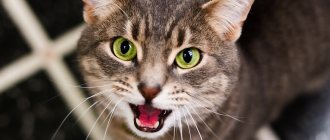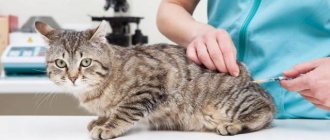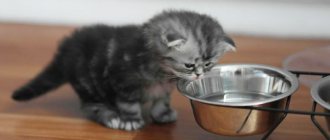Reasons for the disappearance of a cat's voice
If a cat has lost its voice, the owner should know what it might be. In most cases, it is possible to restore the vocal cords at home, when there is no serious illness involved. But there are symptoms that indicate health problems, which also include loss of voice. In such a situation, only a qualified veterinarian can help.
Important! Loss of voice, accompanied by vomiting, hoarseness and excessive salivation, is a reason to urgently consult a veterinarian. You should not self-medicate if your pet is feeling unwell.
The vocal function helps the animal tell its owner about the need for food and drink, that something hurts, or that it just wants affection. A complete loss of speech activity greatly complicates the life of a cat, especially if the cause is a dangerous illness or serious pathology. There are several common causes, the symptoms of which you should be able to recognize.
Foreign object in the throat
When a piece of food or a hard object enters the throat, it blocks the larynx, causing hoarseness and difficulty breathing. The animal cannot free itself from the foreign body on its own, and attempts to do this often lead to injuries to the respiratory organs, larynx or esophagus.
Examination for sore throat
The owner needs to try to pull out the foreign body with tweezers very carefully. If this cannot be done at home, it is better to call a specialist. It is worth protecting your pet from such cases by excluding foods with small bones from the diet and not leaving small toys or objects within its reach.
Sore throat, otitis and other diseases
If the cat is hoarse, the reasons may be a viral or infectious disease. Cats, like people, are susceptible to colds and are often infected through airborne droplets from their owners or as a result of hypothermia. With otitis media, the animal begins to experience pain in the ears, affecting the speech apparatus, which is why it stops making sounds.
With angina, the voice gradually disappears; this symptom is accompanied by swelling and inflammation of the larynx. The problem may also be rhinotracheitis; with this disease, the cat begins to have eye and nasal discharge, sometimes with pus.
Dehydration
The voice becomes hoarse or may disappear completely even with dehydration if the pet does not receive enough water. Lack of water is accompanied by severe weakness, reluctance to move and fever.
Owners should ensure that there is always fresh and clean water in the cat's bowl. If it is present, but the animal still refuses to drink, it needs to be shown to a veterinarian; perhaps this is a serious illness.
Rabies in cats
Speech function can disappear with rabies - one of the most dangerous pathologies for any animal. This infection is fatal and is accompanied by aggressive behavior, loss of swallowing reflexes and voice, slowness and lethargy of movements, muscle cramps, and complete refusal of food and water. The fatal disease occurs in pets that have not been vaccinated.
Important! Rabies is also dangerous for humans, so at the first signs you need to contact a specialist as soon as possible.
Allergic swelling of the larynx
If your cat's voice has completely disappeared, most likely this is due to swelling of the larynx due to an allergic reaction to plants, food, medications or something else. In severe cases, swelling completely blocks the air supply and can lead to death, which often occurs with anaphylactic shock.
Even if the swelling is mild, it makes it difficult for your pet to eat and drink, so your pet should be given antihistamines prescribed by your veterinarian as soon as possible.
Laryngitis
This disease is accompanied by inflammation of the mucous membrane in the larynx, which swells, making it difficult for animals to reproduce sounds, causing hoarseness or complete loss of voice. In the initial stages, the kitten or cat may cough and sneeze. Laryngitis develops against the background of infections, allergic reactions, injuries and many other diseases. Their treatment is sometimes long and complex and should always be under the supervision of a veterinarian.
Poor air quality
Pets must live in ventilated areas with high-quality air, otherwise they may lose their voice. This happens if the owners often smoke in the room, or the air is too dry due to the heating being turned on and poor humidity. If your cat suddenly becomes hoarse for no apparent reason, most likely the problem is in the air, which most affects older animals. Other symptoms will help you pay attention to it: cough, breathing problems, dull coat and dandruff.
Stress
Loss of voice due to stress is not uncommon and may disappear if the pet is very scared, for example due to a fight with a dog or other animal. If a cat suddenly becomes hoarse for this reason, its voice may change or disappear completely.
Important! In stressful situations, veterinarians prescribe medications to restore not only speech function, but also the nervous system, for example, sedatives.
Violation of the innervation of the larynx
Problems with the innervation or swallowing reflex occur for all of the reasons listed above, including disease, allergic reactions, or a foreign body. If a cat constantly wheezes when he meows, then something is bothering him, and such a symptom is a good reason to consult a doctor. When innervation occurs, do not delay a visit to the veterinarian, so as not to aggravate the pet’s condition.
Swelling of gums due to infection
Poisoning by toxic fumes
In case of poisoning with toxic vapors and various substances, speech dysfunction may also occur. The poison enters the larynx through food; if we are talking about toxic vapors, they can enter the respiratory tract accidentally, for example, when the animal is in a room where repairs are being made. This can also happen on the street if the cat walks in a contaminated area. Vapors provoke serious poisoning that can lead to the death of the animal.
Calicivirus
Another disease that affects the larynx is calicivirus, in which watery ulcers form on the larynx and tongue of the animal. As it develops, it becomes difficult for the pet to eat and drink, pain appears when swallowing and making sounds, lethargy and weakness, and the nose becomes dry.
Calicivirus is a viral disease that requires emergency care and treatment from a veterinarian.
Why is there a problem?
Pulmonary causes and additional symptoms
Cough is one of the main symptoms of rhinotracheitis in an animal. If the kitten does not meow and its respiratory rhythm has changed, then in most cases the problem is associated with pathologies of the respiratory system. Many pulmonary diseases are characterized by copious secretion of saliva and mucus, which the pet often swallows. If a cat is breathing heavily and wheezing constantly, then this indicates a number of pathologies presented in the table.
| Disease | Short description | Additional symptoms |
| Rhinotracheitis and calcivirosis | The mucous membranes of the respiratory tract and intestines become inflamed | Heat |
| Diarrhea | ||
| Cough and severe wheezing | ||
| Ulcers on the mucous membranes | ||
| Purulent and mucous discharge from the eyes and nose | ||
| Pneumonia | Inflammatory reaction in the lungs associated with viruses and bacteria | Barking type cough |
| Temperature increase | ||
| Deterioration of general condition | ||
| Bronchial asthma | Chronic inflammation of the airways with narrowing of the pulmonary lumen | Frequently pressing the cat to the floor |
| The animal is breathing hoarsely and coughing | ||
| In advanced cases, the pet suffocates | ||
| Helminthiasis | Associated with the entry of small parasites into the respiratory tract | Vomiting and nausea |
| Breathing with wheezing | ||
| Broken stool | ||
| The pet eats almost nothing | ||
| Cancerous tumors | Accompanied by the proliferation of malignant cells in the respiratory organs | The cat grunts and sniffles when it breathes |
| Changed voice, and sometimes meowing disappears completely | ||
| Shortness of breath and cough with bloody impurities | ||
| Laryngeal edema or laryngospasm | Occurs against the background of poisoning with household chemicals, an allergic or autoimmune reaction | Acute lack of oxygen |
| Restless state | ||
| The cat meows hoarsely and moans often |
Other reasons can also affect heavy breathing in a cat and severe wheezing:
The animal may experience difficulty breathing due to the triplication of the skull.
- foreign body entering the throat;
- brachycephalic syndrome;
- pulmonary edema;
- congenital anomalies;
- tracheal collapse.
Non-respiratory sources
When a cat has hoarse breathing accompanied by a loud sound, this does not always signal a pathology in the respiratory system. Often a cat grunts and breathes through his mouth due to the following disorders:
- Protrusion of the diaphragmatic hernia. The symptoms are reminiscent of bronchial asthma, with the pet constantly being in one position and breathing heavily.
- Heart diseases. In case of heart failure, the animal rarely develops a cough, and the cat often wheezes and breathes through his mouth. Arrhythmia, myocardosis and myocarditis can affect impaired breathing.
- Severe renal failure. The pathology often provokes pulmonary edema, as a result of which the pet refuses to eat, is constantly in a semi-sitting position and coughs.
Emergency help at home
Seizures in a cat: causes, what to do, treatment
If there is a warning sign, you need to observe your pet and understand what other symptoms accompany the loss of voice. It would not be superfluous to take his temperature, check how the cat reacts to water and food, examine the larynx and oral cavity for the presence of small objects, inflammation and swelling. In any case, the veterinarian will ask what caused the symptom, so any additional signs should be remembered or written down.
Important! You should not give your animal unfamiliar medications without identifying the cause of the symptom. This can cause complications, so it is best to wait until it is examined by a qualified professional.
The voice can disappear and then appear, but in any case, an examination by a veterinarian should not be postponed. Even if it is clear from the symptoms what exactly was the cause, for example, a cold, self-medication is not the best option. A pet's recovery can be delayed if there is inadequate help, especially if the owners try to cure it with medicines from their first aid kit or folk remedies.
What can the owner do on his own?
Harm from smoking
A cat's vocal cords can become damaged due to prolonged exposure to a smoky room.
A cat stays for a long time in a space with low humidity, and if there is constant smoking in the room, it is likely that the cat’s vocal cords and larynx will be damaged as a result of their drying out. Due to the drying out of the respiratory tract, a favorable environment is created for the development of viral and infectious pathologies, which leads to hoarseness and lack of voice. In this case, additional symptoms such as nausea and vomiting are possible.
Among other things, inhaling toxic fumes is quite capable of causing severe intoxication of the body and ending in death for the animal. The presence of these symptoms requires immediate contact with the clinic.
After anesthesia
Cats often lose their voice after anesthesia.
Dehydration in a cat can also cause a similar symptom.
If a pet does not have free access to water and does not drink enough fluids, the respiratory system may dry out. You can often observe a lack of coordination of movements due to dizziness, the animal stumbles or is “led” from side to side. Possible nausea.
If access to water is not limited, but signs of dehydration are still visible, it is urgent to understand the reasons for this phenomenon. The presence of severe pathology and the presence of wheezing is only one of the manifestations.
The lack of voice in a pet can also be caused by inflammation and complications after infectious diseases.
Typically, such ailments are transmitted by airborne droplets, especially sore throat. Laryngitis is accompanied by the accumulation of mucus in the area of the vocal cords, which leads to wheezing gurgling sounds coming from the cat. Dumbness can occur as a consequence of the inflammatory process that develops in the affected organs, possible swelling in the throat.
Calcivirosis
The calcivirus virus is also accompanied by muteness, which occurs due to the presence of painful wounds and ulcers in the larynx
It is important to distinguish this disease from stomatitis. With stomatitis, wounds or ulcers affect the oral cavity - the area of the palate
Perhaps the most dangerous cause of such a symptom is cat rabies.
- The presence of pathology has a detrimental and inevitable effect on the central nervous system and in the initial stages occurs without symptoms.
- Further, atypical behavior, aggressiveness, and excessive drooling are observed.
- The pet is lethargic, non-communicative, some inhibition in reactions is visible, and is afraid of light and water. There is no appetite at all.
Rabies cannot be treated; in this case, the pet must only be euthanized. The owner should be especially vigilant about his own health and take all necessary measures to save him.
Examination and treatment at home
A cat has a nosebleed: causes and diagnosis
If your pet begins to cough, his voice disappears and he begins to feel sick, you can try to help him at home. This is possible if the owner is able to independently eliminate the cause, for example, move the animal to a ventilated room or remove a foreign body from its throat. Examination of the larynx allows one to draw primary conclusions about the cause and condition of the animal. If your throat is red and swollen, it is most likely due to an allergy or infection.
First aid
You can give your pet an antihistamine, for example, Tavegil or Suprastin, they will help slightly eliminate the first symptoms before being examined by a doctor. A cold or infectious disease, for example, laryngitis, requires complex treatment, which must be carried out by a veterinarian.
For a while, it is worth excluding food and products that can cause allergies from your cat’s diet. It is necessary to ensure constant access to water, especially when it comes to dehydration.
The cat is choking and wheezing: what to do
You need to open the mouth and pull the tongue forward, check the throat for foreign objects that should be removed, including mucus or vomit. This will help clear your airways. To do this, hold the cat by its hind legs and raise its head.
Important! If you suspect a spinal injury, you should not lift or move the animal. If removal of the foreign body does not help, you must begin first aid.
If removal of the foreign body does not help, you must begin first aid.
First aid for respiratory arrest
Step-by-step instruction:
How to give artificial respiration to a cat
Start artificial respiration: lay the cat on its side, pull the tongue forward, cover the mouth with your hand and straighten the neck. Air is inhaled through the cat's nose every 3 seconds.
It is important that the chest rises, but does not arch from excess inhaled air. During artificial respiration, you need to check for a heartbeat. If the heart is beating but there is no breathing, you need to inhale air at a rate of 10 breaths per minute until the cat breathes on its own. If you are completely sure of cardiac arrest, begin chest massage. If respiratory arrest is detected and resuscitation begins, it is important that someone call a veterinarian or take the cat and its owner to the clinic.
Important! Cardiopulmonary resuscitation should not be performed if the cat is conscious.
Instructions on how to perform chest compressions on a cat
Visit to a specialist
The cat is drooling: the main causes and treatment options
The veterinarian will determine exactly why the animal began to show anxiety, and for what reason problems with the speech apparatus arose. In most cases, the problem is solved in a clinical setting, where the necessary equipment and tools are available. The specialist is able to do everything possible to normalize the pet’s condition. The owner needs to listen carefully to all the recommendations, confirm the symptoms and be able to help the cat afterwards at home.
Help in hospital
Varieties
If the owners find that the cat wheezes when he breathes, wheezing and other pathological noises are recorded, then it is worth taking the pet to the veterinarian. Such a violation is divided into several types, presented in the table:
| Type | Peculiarities |
| Fine bubbles | The pathological sound is a consequence of the collapse of small air balls that are formed during sputum |
| Such wheezing is heard when the pet is sleeping or awake, and is characteristic of bronchitis, pneumonia and pulmonary infarction. | |
| Medium bubble | Reminds me of the sound of air blown through a tube |
| Observed with inflammation of the bronchi, which is associated with abundant accumulation of mucus | |
| Large-vesicular | Can be listened to without special devices |
| The cat exhibits noisy breathing with severe wheezing, and the pet can often burp liquid accumulated in the lungs | |
| Caused by pulmonary edema |
https://youtube.com/watch?v=_f7JN2cIdrI
Treatment Options
In order for a cat to stop coughing and its speech apparatus to recover, complex therapy will be required. It will depend on the cause of the pathology, because the pet may have a barely audible cough or a complete loss of voice in combination with other symptoms.
First of all, you need to make an accurate diagnosis; this can only be done by a specialist in a hospital setting. In severe cases, the pet is left in the hospital for a while if it needs professional care, for example, installation of IVs, constant injections, treatment of wounds and injuries.
In milder cases, the animal is immediately discharged home and therapy is prescribed under the supervision of the owner. These may include medications for each specific case, oral rinsing, mouth sanitation and other procedures. If there is a serious illness, the cat will need complete rest and good care, a change in diet and room. If the owner is able to cope with this on his own, he will not have to constantly resort to the help of a veterinarian.
Oral problems in cats are not uncommon, and their causes can be varied. You should not think that the animal will be able to recover on its own, because loss of voice is often a symptom of dangerous diseases. It is better to examine your pet as soon as possible and contact a specialist.
How to help a cat
Helping a cat at home depends on the reason that led to the cat’s loss of voice being determined by the owner:
- if the room is hot, the air is dry, and the cat has no water, he should be given a drink;
- if the cat has inhaled tobacco smoke, irritating aerosols, paint fumes, it must be taken out into fresh air as quickly as possible and given milk to bind toxins;
- if the cat screamed for a long time before losing his voice, he needs to put 2 drops of peach oil into his nose for 5 days to relieve irritation from the mucous membrane of the larynx;
- if the cause is stress, sedatives are used: Feliway, Stop-Stress, and they also try to remove the stress factor, if possible.
After providing first aid, the cat is observed; if the condition does not normalize, a visit to the doctor is inevitable. Symptoms that require a cat to be taken to the clinic:
- fever;
- foreign body in the larynx;
- laryngeal injury;
- signs of respiratory failure: difficulty breathing; shortness of breath - increased respiratory rate (the norm for cats is 20–40); cyanosis of the skin.
- cough, runny nose, discharge from the eyes;
- dehydration caused by: vomiting, diarrhea; blood loss; decompensation of chronic diseases (diabetes mellitus; chronic renal failure).
- refusal of water and food.
- suspected rabies;
- allergic reaction.
In some cases of voice loss, the cat requires intensive therapy in a hospital setting.
In cases of acute laryngeal stenosis due to laryngeal edema, delay is unacceptable; this is a life-threatening condition. The pet should be taken to a veterinary clinic as quickly as possible, placing a cold compress on the neck area. If corticosteroids and antihistamines are available, they should be administered to increase the chances of reaching the clinic, for example, Dexamethasone 1–2 mg/kg body weight IM; Diphenhydramine 1 mg/kg body weight IM. It is necessary to administer a corticosteroid in conditions of developing laryngeal edema even against the background of an existing infectious disease; this is permissible for health reasons to stabilize the pet’s condition when transported to a veterinary hospital.
Infectious diseases, diseases of the ENT organs and upper respiratory tract - used:
- broad spectrum antibacterial drugs: Sinulox; Ciprofloxacin; Doxycycline.
- infusion therapy to relieve intoxication: Ringer's solution; saline.
- diuretics - to force diuresis in order to reduce intoxication. For example, Lasix;
- immunomodulators: Fosprenil; Gamavit.
For acute laryngeal stenosis, the following are used:
- corticosteroids: Prednisolone; Dexamethasone.
- antihistamines: Diphenhydramine; Pipolfen.
- adrenomimetics (adrenaline);
- diuretics (Lasix);
- tracheal intubation with oxygen supply;
- If intubation is not possible, a tracheostomy is performed, when a tube is inserted into the trachea through a small incision to provide air for breathing.
Photo gallery: drugs for treating voice loss in cats
Sinulox effectively suppresses pathogenic microflora of the upper respiratory tract and ENT organs.
Prednisolone has a powerful anti-inflammatory and anti-edematous effect and is used for acute laryngeal stenosis.
Diphenhydramine prevents the release of histamine by mast cells when an allergic reaction occurs, thereby reducing allergic inflammation and swelling.
Doxycycline has a detrimental effect on both bacteria and intracellular parasites - mycoplasmas.
Peach oil, when instilled into the nose, reduces irritation of the mucous membranes of the upper respiratory tract.
At home:
- carry out prescriptions made by the veterinarian;
- protect the cat from hypothermia;
- provide clean and humidified air in the room where the cat is located;
- fed soft food;
- The cat's drink should be warm;
- You can use infusions of coltsfoot and plantain for feeding your cat as expectorants and anti-inflammatory agents that can soften cough and reduce inflammation of the laryngeal mucosa.
Loss of voice in a cat can occur for many reasons, most often it is caused by laryngitis, infectious and non-infectious. In each case of voice loss, its cause must be established, especially when it is not obvious and other symptoms of the disease are present. The most dangerous reasons for loss of voice are acute stenosis of the larynx, caused by swelling of its mucous membrane, as well as rabies infection.
Spring came
So we figured out why a newborn kitten meows constantly. Adult cats also sometimes “voice” for similar reasons. But there are several more options for answering the question posed.
True, the next point will explain the behavior of only adult individuals. But it’s worth taking it into account. The thing is that in the spring, cats' sexual desire increases. During this period, they begin to meow very loudly. This behavior applies to both females and males.
The explanation is very simple: cat hormones are acting up. To calm down an animal that has developed a sexual desire, you will have to either use special hormonal drugs (they help, but temporarily), or castrate/sterilize the cat. This is the only way to defeat the annoying yelling from your pet.
Attention
Why does my Scottish kitten meow constantly? And not only Scottish, or Siberian, or Persian, but also an ordinary mongrel? In this way, the animal can simply attract attention to itself. A common method, very effective. If someone wants attention, they talk about it. And small children usually cry. Kittens do the same thing - they are the same babies. They also beckon to you. Now do you understand why the kitten meows constantly?
You should pay attention to the fact that in this way they attract the attention of not only children, but also adults. Only they, as already mentioned, try to make poises between “phrases”. If an animal is too bored and longs for communication, it may not shut up for a long time.
What to do in this case? There is only one way out - to pay attention to your pet, even if it seems to you that you have already been fussing with him a lot. Only in this case will the animal stop reminding itself of itself. Otherwise, you will have to listen to the “cat concert” for days on end. We’re exaggerating, of course, but... As long as an animal craves communication, it will not shut up.











